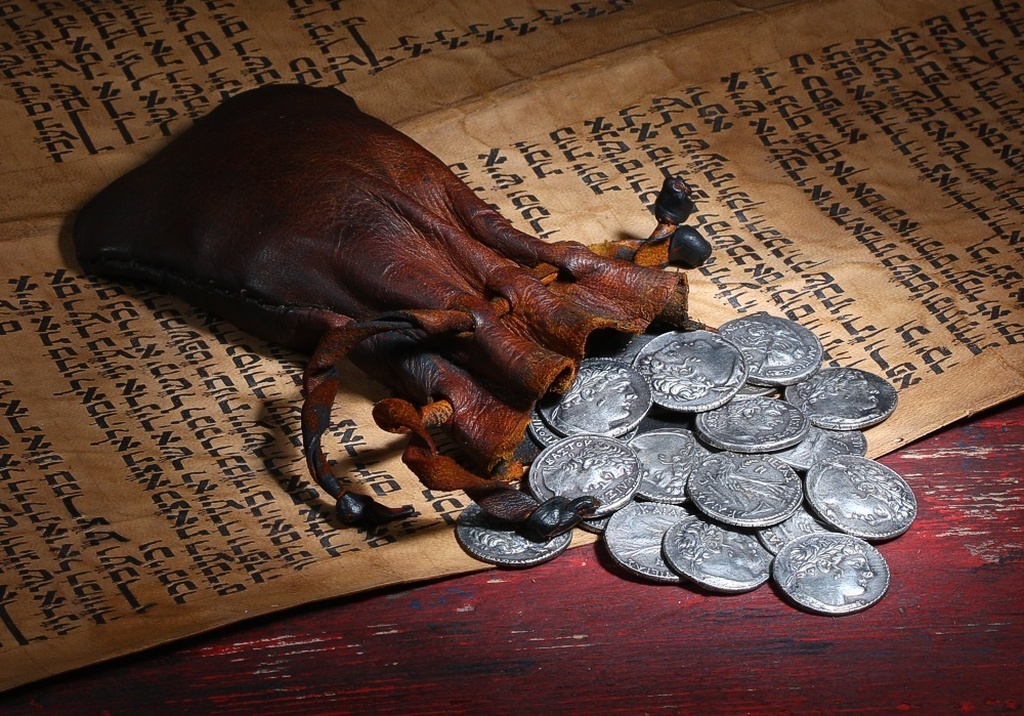
Selling Out Christ
Judas sold out Jesus Christ for thirty pieces of silver, good, old-fashioned hard money. Our modern Judases are ready to sell out our Lord for paper, for debt money! Worse, they will not believe that they are selling out Jesus Christ.

- R. J. Rushdoony
Chalcedon Report No. 319, February 1992
The conflict of the early church with Rome was over the issue of controls. Rome was ready to accept and license almost any religion on examination, because it believed that religion provided the necessary social cement to the social order, but it would tolerate no unlicensed religions. The early church rejected all certification, licensure, regulation, or controls on the grounds that Jesus Christ is the universal emperor, “the blessed and only Potentate, the King of kings, and Lord of lords (1 Tim. 6:15). In due time, all men would confess Him, and all men bow before Him (Phil. 2:9–11). Caesar was therefore under Christ, not Christ under Caesar. Rome fought the church bitterly as an empire within the empire; the church and Christian groups increasingly provided better government than Rome in areas of health, education, welfare, law courts, and more.
Religious freedom and tax exemptions are the results of this struggle. The Christian ministries should be immune to statist controls as branches of a supernatural Kingdom.
All this some churchmen are ready to surrender. What some medieval popes, Protestant reformers, and some Puritan leaders fought for is now being forgotten by many.
There are increasing numbers of churchmen favoring some kind of vouchers plan for Christian schools. But the courts have uniformly maintained that, whatever any legislative act may decree, where tax funds go, state controls must follow. This will put the Christian school movement in the hands of the states.
Many state officials favor this move, and why not? They see the children slipping out of their hands; 40 percent now are in Christian and home schools, and it could be over 50 percent by the end of the decade. What better way to regain control over them than by means of some kind of vouchers plan? What better way to nullify a great Christian movement than a payoff?
The churchmen who advocate vouchers are not honest enough to admit that this is a form of socialism. They virtually salivate as they describe what all they can do with the thousands upon thousands of extra dollars. They are going to do the enemy’s work for him, and all in the name of Christ!
Judas sold out Jesus Christ for thirty pieces of silver, good, old-fashioned hard money. Our modern Judases are ready to sell out our Lord for paper, for debt money! Worse, they will not believe that they are selling out Jesus Christ.
If Christians will not support their churches and schools, they do not deserve to exist. Getting something for nothing is the premise of socialism, and the “something” that people get is the death of freedom and of faith.
The early church, an underground movement meeting in homes, created churches, schools, homes for orphans and the aged, courts of arbitration, and more. They were not a wealthy people. They simply believed that their faith was worth living, dying, and paying for. Our latter-day churchmen want the state to do the paying.
There will be a pay-off later, from Jesus Christ.

- R. J. Rushdoony
Rev. R.J. Rushdoony (1916–2001), was a leading theologian, church/state expert, and author of numerous works on the application of Biblical law to society. He started the Chalcedon Foundation in 1965. His Institutes of Biblical Law (1973) began the contemporary theonomy movement which posits the validity of Biblical law as God’s standard of obedience for all. He therefore saw God’s law as the basis of the modern Christian response to the cultural decline, one he attributed to the church’s false view of God’s law being opposed to His grace. This broad Christian response he described as “Christian Reconstruction.” He is credited with igniting the modern Christian school and homeschooling movements in the mid to late 20th century. He also traveled extensively lecturing and serving as an expert witness in numerous court cases regarding religious liberty. Many ministry and educational efforts that continue today, took their philosophical and Biblical roots from his lectures and books.